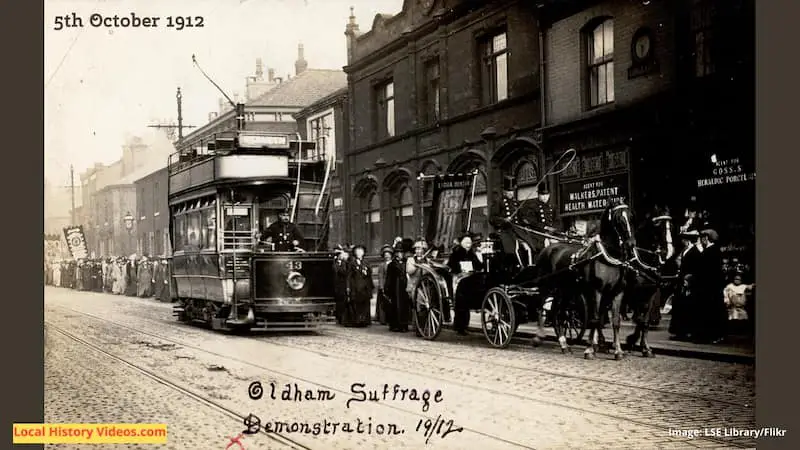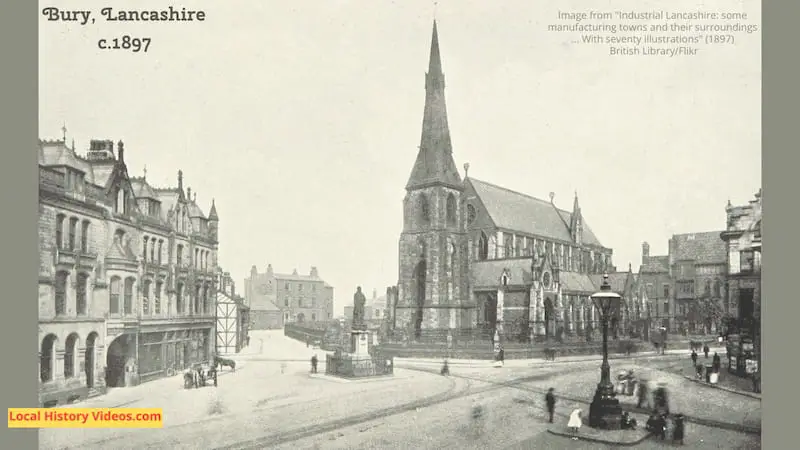Glimpse history through old images of Oldham, in the Greater Manchester area of North West England, UK.
Maytime Celebrations 1928
See Oldham’s Maytime celebrations in 1928, when the rose queen was crowned, before being processed through the streets along with a long line of adults, children and horses.
Crowning the rose queen at Oldham, Lancashire (1928) – British Pathé on YouTube
Mill Nursery 1951
At a very early hour of the morning, even before the milkman arrives, 30 vans decorated with cartoons would go around the Oldham area picking up the toddlers of parents who worked in the mills.
The children had to be at least 6 months old to use this service, which was started after the mills had problems recruiting women with childcare needs.
Inside, the toddlers were strapped in with safety belts. The babies had built in cribs.
The entire van of toddlers and babies was supervised by one woman. Up front a man drove the van.
At the mill nursery, the staff are dressed in nurse uniforms.
Mill Nursery (1951) – British Pathé on YouTube
Drive Through Oldham 1994
A 1994 home video of a drive through the town centre and beyond shows a variety of locations including the Odeon Cinema on Union Street, Mumps Bridge, Huddersfield Road, and many shops, businesses and homes.
Oldham 1994 – Mike Calverley on YouTube
Oldham Buses 1999
This is a trailer for a transport DVD you can buy from PMPfilms. Although the focus is on the buses, you can also see lots of shops, buildings, and pedestrians.
OLDHAM BUSES JUNE 1999 – DaveSpencer32 on YouTube
A Bit of Oldham History
Extract from
Historical Sketches of Oldham
by Edwin Butterworth
Published in 1856
Pages 157-159
“The first great effect of the introduction of the spinning machinery had been to produce yarn with such rapidity and quantity as to cause an extreme demand for weavers to convert the articles into cloth, and the productive powers of machinery became so amazing as to totally disable the hand-loom from maintaining a proportionate pace. The inevitable result was that numerous concerns directed their sole attention to the production of twist expressly for exportation.
This new system of trade extended rapidly, and in a few years the cotton manufacturers of the continent began to compete keenly with the manufacturers of our own country.
Although the number of weavers continued the rate of profit, and consequently of wages, was on the decline, owing principally to the intense competition prevalent in the market.
In the latter end of 1807, the war was prosecuted with great vigour, and recruiting for the army, as well as for the militia of various counties, seemed almost the briskest business carried on.
A public meeting of the friends of peace, held on Oldham edge, on the 25th December, 1807, resolved to petition parliament for a cessation of hostilities. Such a petition was, however, unavailing, and shortly afterwards, the distressed condition of the weavers led to the holding of meetings of that body, and ultimately to turnouts, in Manchester and the surrounding towns, for the purpose of obtaining an advance of wages.
On the 30th of May, 1808, intelligence reaching Oldham that a serious riot of the weavers had just occurred at Rochdale, the Oldham Volunteers speedily assembled, and were on their way to render assistance to the authorities of the disturbed locality when they were suddenly attacked by a large crowd on the Rochdale road, and severely pelted with mud and stones. In the course of the day, the windows of several parties in Oldham, obnoxious to the populace, were broken.
Two days afterwards, on the 1st of June, a large meeting of weavers and others was held on Oldham edge, and, at its conclusion, a strong party of the crowd paraded the streets of the town, demolished the windows of Mr. Lees in Church lane, and terminated their feats for the day by prevailing on several manufacturers, while under feelings of alarm, to subscribe a document, pledging them to an advance of the prices paid for weaving.
In the course of a few hours, a troop of the Sixth Dragoon Guards, and a few companies of the Herefordshire Militia, were quartered in the district, and remained for some time.
The employment of females in the hatting trade occasioned considerable opposition on the part of the male operatives engaged in that business, in 1809.
In July, a party of the men had an interview with Mr. Barker, hat manufacturer, for the purpose of expressing their disapprobation of the injury sustained from the competition of female operatives.
During the interview, two of them, named Dalton and Midgley, uttered intimidating language; for this, they were taken before the magistrates, convicted in a penalty of £20, and, in default of payment, committed to two months’ imprisonment in Salford goal.
When the expiration of the period of confinement, the 19th of September, arrived, the two offending hatters returned to Oldham in a chaise, but on its reaching Coppice nook, they were met by a large body of their fellow workmen, who instantly took the horses from the carriage, and conveyed it through the principal streets.
A turnout of the male hatters against all masters who employed female operatives ensued, but its results were such as usually attend similar proceedings, being productive of much injury to all parties, without a solitary advantage.
The levying of a toll on the stalls placed in the streets, upon the market day, Saturday, and during the fairs, by the agents of John Lees, Esq., on the plea of his being lord of the reputed manor of Oldham, caused considerable local excitement, and a public meeting of the inhabitants being held on the subject, at the Spread Eagle Inn, January 11, 1810, Mr. Lees rendered any further measure unnecessary, by abandoning, without solicitation, all future claims of that description.




